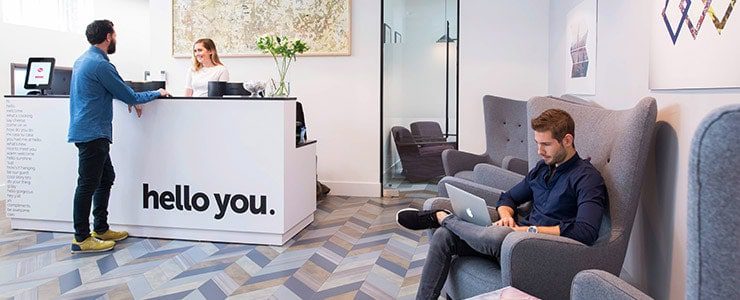
Important banks embracing coworking
Changes are afoot in the world of corporate banking, as an increasing number of major banks are choosing coworking spaces over traditional offices.
Traditionally, banks have been seen as strictly formal places, where there’s a firm barrier between personnel and clients, but the now-dated cubicle partitions of the world’s banks are making way for collaborative, open-plan work environments that benefit both employers and customers.
Today’s forward-thinking financial institutions have embraced the global trend for flexible working environments and are enjoying shared office spaces. The main reason many banks are changing working practices is to release them from the restrictions of set hours, with the employees being stuck in small office cubicles.
Workers can meet and connect with like-minded coworkers, either in the same industry or in different sectors. As well as improving employee wellbeing, as only a flexible workspace can, it also saves the banks money and enables them to offer an improved service to customers outside the usual 9-5 restraints.
Royal Bank of Scotland
The Royal Bank of Scotland is one of the major players opting for coworking space. Some employees are now based in flexible workspaces at the Square, in the heart of Edinburgh, in a comfortable, spacious, open-plan office. It is tailored not only to the needs of startups, entrepreneurs and freelancers but also to the RBS employees.
The aim is to offer a stimulating work environment that will help new ideas to develop and thrive, far away from the somewhat stuffy image banks have had for many years. The Edinburgh coworking space is providing an interesting alternative to the bank’s usual formal setting.
National Australia Bank
The National Australia Bank, based in The Village, Melbourne, is another forward-thinking bank embracing changing patterns in the global workplace. The bank’s Village Customer Innovation Centre has brought a breath of fresh air into its usual corporate environment.
Employees enjoy using flexible, drop-in desk space, with additional casual meeting areas for a catch-up with the team.
Workers looking for collaborative working environments have welcomed the transition to coworking space. They have escaped the solitude of working from home during the pandemic and are now encouraged to meet clients in the coworking space, where the emphasis is on creative surroundings to develop new ideas.
BNP Paribas Fortis
Employees from Belgium’s national bank, BNP Paribas Fortis, are occupying coworking space in the centre of Brussels, where normally startups and entrepreneurs strive to take their innovations to the next level.
The coworking space, Co.Station, is being run in partnership with the bank. Not only does it offer an inspirational working environment, but it also provides funding opportunities to support forward-thinking businesses that want innovation and more creative thinking.
The coworking space hosts regular events, where leading entrepreneurs and established business people from various industries lead workshops. The open-plan layout provides diverse seating arrangements and meeting areas that encourage connections and communication.
JP Morgan Chase
The leading US bank, JP Morgan Chase, whose headquarters are in New York, has recognised the decline in regular bank branches. Its solution has been to develop an action plan, whereby 400 new branches will operate in coworking spaces to replace the larger traditional branches that have been struggling.
The company has said it will encourage a move into new markets and boost small business lending to reflect the changing economic climate. JP Morgan estimates this will increase small business lending by 20% over the next three years, equating to around £3.3 million.
Bank of America
The national Bank of America is also embracing flexible working environments. It already has coworking spaces in Mexico City and now its offices at Bank of America Tower, in New York City, have no assigned desks.
The bank operates a modern office design that has ditched the traditional layout, comprising rows of individual cubicles. The latest offices feature common areas where employees can collaborate, quiet zones, sit and stand desks, workstations with computer equipment and areas for conferences or private phone calls.
The world’s banks are starting to recognise the value of flexible working and feel this also benefits employee productivity. Research has shown that offering flexible working hours reduces stress and absenteeism among employees. Having the ability to manage their time creates greater job satisfaction and a natural surge in productivity.
© chrisdorney / Shutterstock.com



